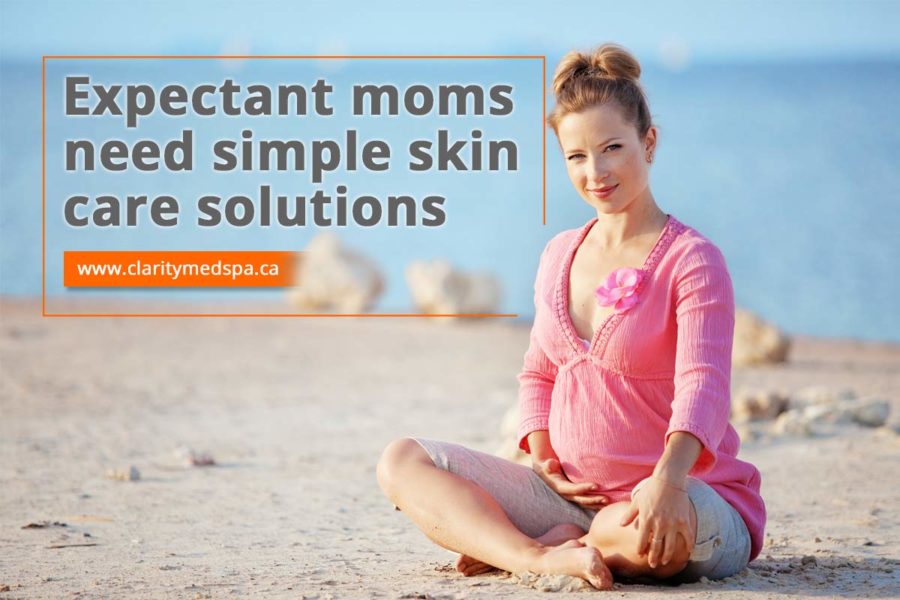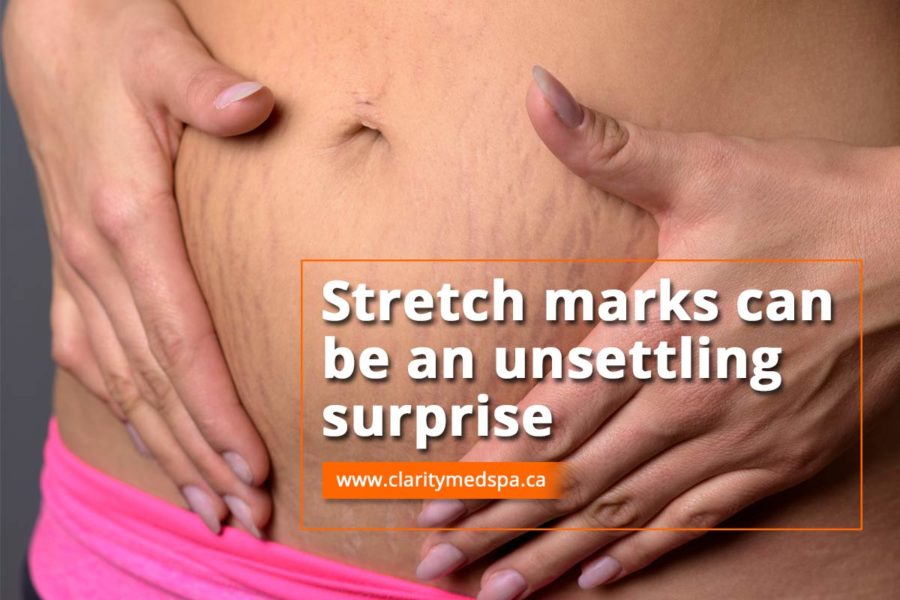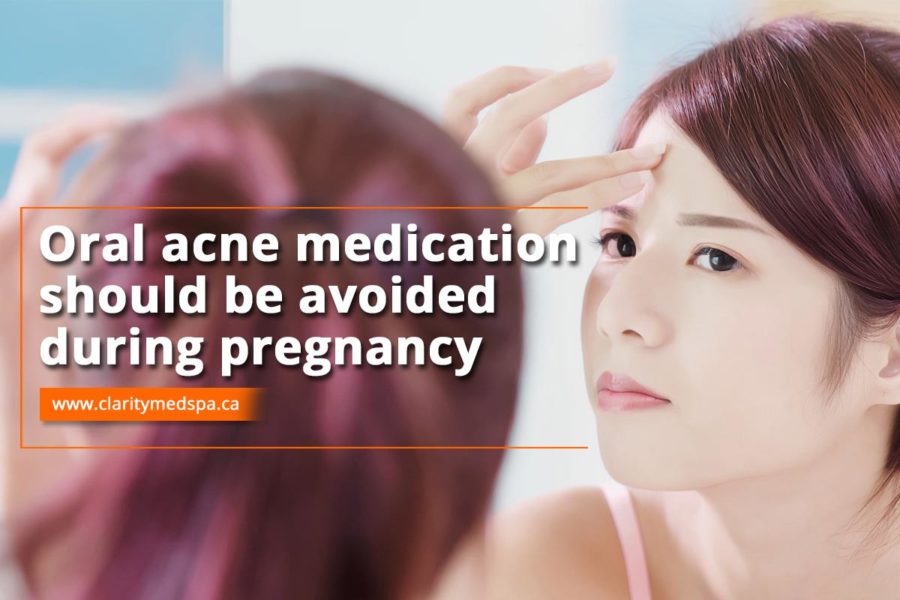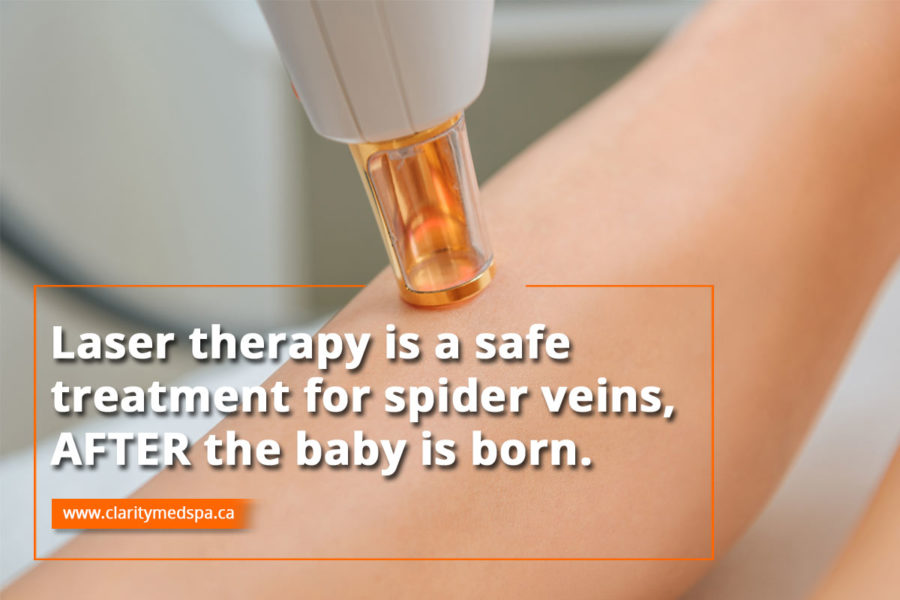Skin care for New Moms: Treating Common Pre- and Post-natal skin care Issues
If heartburn, backaches, and puffy feet aren’t enough to deal with during pregnancy, a host of new skin care issues can suddenly arise. Some will resolve themselves during pregnancy or after childbirth; others may linger on afterwards. Awareness helps prepare for these unpleasant surprises and reassures new moms that these changes are healthy and normal.
Though that fabled pregnancy “glow” may initially feel unattainable, a few key steps can help counter the effects of pregnancy-related skin problems. After all, skin care for moms should be safe, natural and — above all — simple! Learn why treating common pre- and post-natal skin care issues is easier than you might think.

-
- HyperpigmentationAlso called melasma, or a “pregnancy mask,” most women experience some form of hyperpigmentation during pregnancy, though it is often more pronounced in individuals with darker complexions. Melasma results in dark, symmetrical patches of skin on the upper lip, forehead, or nose. Sun damage can also cause similar discolourations over time.
Pregnancy-related melasma is caused by increased production of estrogen and progesterone. While there are no health-related impacts of hyperpigmentation, the changes in your appearance can be unsettling.
- HyperpigmentationAlso called melasma, or a “pregnancy mask,” most women experience some form of hyperpigmentation during pregnancy, though it is often more pronounced in individuals with darker complexions. Melasma results in dark, symmetrical patches of skin on the upper lip, forehead, or nose. Sun damage can also cause similar discolourations over time.

- Stretch MarksWhile genetics has been proven to be a significant contributor to the development of stretch marks, some conditions can make a woman more susceptible. An unusually rapid weight gain (or loss) can increase the likelihood of stretch marks, as can breast enlargement surgery. Stretch marks are more common in women but do also occur with men.
- AcneMany pregnant women find themselves surprised by sudden acne breakouts, typically during the first two trimesters. This can be attributed to a surge of androgen hormones. Androgens generally are thought of as “male” hormones; however, they are produced in small amounts by the female body. Androgens are involved in the skin’s natural oil production.
Any previous acne sufferer will be more prone to breakouts during pregnancy, as will any woman who regularly experiences acne at the onset of her menstrual cycle. Pregnancy-related acne usually goes away after childbirth, though an effective, gentle skin care regime will help speed up this process.

Restricted Substances
skin care during pregnancy is complicated by the fact that several common skin care ingredients are deemed to be medically unsafe for expecting women.
Isotretinoin
-
- should be avoided by expecting mothers, as it can lead to congenital disabilities.
Retinol and Vitamin A are best avoided, as high doses have been documented to lead to fetal deformities.
Any neurotoxins (such as Botox) are also prohibited since they could cause paralysis in new babies.
Chemicals such as hydroquinone (a skin lightener, used to treat hyperpigmentation) are off limits as well. While there is insufficient data of the effect on human fetuses, it is known to adversely affect animal fetuses and is not worth the risk.
For acne sufferers, the recommendation to avoid salicylic acid and benzoyl peroxide means that most drugstore acne remedies are off-limits during pregnancy.
Natural Remedies
Acne
Since many over-the-counter acne treatments may contain harmful chemicals, it’s best to consult your doctor before using any medication.
To avoid aggravating acne during pregnancy, avoid abrasive scrubs or alcohol-based products. Use a gentle, oil-free facial cleanser, and avoid over-washing. Natural substances such as baking soda, apple cider vinegar, honey, and lemon juice all have acne-fighting properties. Topically-applied tea tree oil is considered safe if used sparingly.
Consult your family physician and a skin care specialist to discuss how to incorporate pregnancy-safe ingredients into your routine.
Hyperpigmentation
Vitamin C serums are considered a safe, natural remedy for skin discolouration. To avoid further reddening of the skin, apply a mineral sunscreen daily (avoiding chemical-laden solutions).
Since most products used to treat melasma have not been proven safe for breastfeeding women, it’s best to wait until your babe is weaned before seeking advanced treatment. Once your doctor gives you the go-ahead, chemical peels and laser therapy are proven to be effective in combating hyperpigmentation.
Stretch Marks
Moisturizing daily with a naturally-sourced oil should be a priority during pregnancy. Coconut oil, almond oil and cocoa butter are touted for their softening and hydrating properties.
Exfoliation can lighten the appearance of stretch marks; try natural substances like sugar, apricots, and lemon juice for their skin-sloughing effects. Pure aloe vera gel is also a safe, soothing alternative for commercial moisturizers.
While stretch marks will fade somewhat after birth, you can give this process a boost by keeping your skin hydrated.
Post-Natal skin care Issues
While hyperpigmentation, acne, and stretch marks may linger after childbirth, new issues can arise that are particular to the post-natal experience.
-
- Puffy eyes and dark circlesMostly due to a lack of rest caused by a newborn’s irregular sleep cycles and those overnight feedings (not to mention the added anxiety that comes from parenting a newborn) and you’re bound to see some puffiness and darkening around the eyes.
After childbirth, the raised progesterone levels of pregnancy drops, causing thinning skin. Collagen production also dips during this time, which means the skin becomes less firm. Together, these factors can accelerate the signs of ageing. To combat this process, be sure to stay hydrated (particularly if nursing). Grab some extra shut-eye whenever you can during those first few months — even a quick cat-nap can help repair skin damage!
Eating well is vital for nursing mothers, and a vitamin-rich diet is a powerful tool to reduce the signs of ageing. Most of the puffiness will disappear once the extra fluid drains from your system. In the meantime, cold compresses can be used to reduce swelling around the eyes. Cucumber-based face masks have a cooling, calming effect, and cucumbers are an effective natural treatment for inflammation.
- Puffy eyes and dark circlesMostly due to a lack of rest caused by a newborn’s irregular sleep cycles and those overnight feedings (not to mention the added anxiety that comes from parenting a newborn) and you’re bound to see some puffiness and darkening around the eyes.

- Spider Veins Some mothers may see tiny veins appearing on their faces, often around the cheeks and nostrils. This is caused by the dilution of small blood vessels near the skin’s surface as a result of increased blood flow during pregnancy. After childbirth, spider veins may also remain on the lower legs, though this is more common following a second (or third!) pregnancy.
While spider veins are not a significant health threat, this may not be quite the post-baby look you were hoping for! To keep spider veins on the legs from worsening, experts recommend avoiding sitting with crossed legs, elevating your feet when possible (even during sleep), and daily exercise — a simple walk around the block can do wonders for circulation.
Once you’re out and about after those first few weeks, speak to a skin care specialist about long-term solutions to childbirth-related skin issues. Specially formulated serums and eye masks can revitalize the delicate eye area, even reversing signs of ageing. Broken capillaries on the face respond well to photo facial light treatments. This non-invasive treatment often produces results in a matter of days, with no resulting damage to the skin.

Pregnancy and childbirth come with a litany of unexpected discoveries. While many of these are exciting, others you could probably do without. If you’re suffering from pregnancy-related skin care issues, you don’t need to wait until after childbirth to start treatment. Call Clarity Medspa at (416) 960-2222 to speak with a skin care specialist about safe, natural options. We’re proud to work with Toronto mothers, helping new moms get back their old glow!

 Linkedin
Linkedin Facebook
Facebook  Instagram
Instagram  Twitter
Twitter  Youtube
Youtube